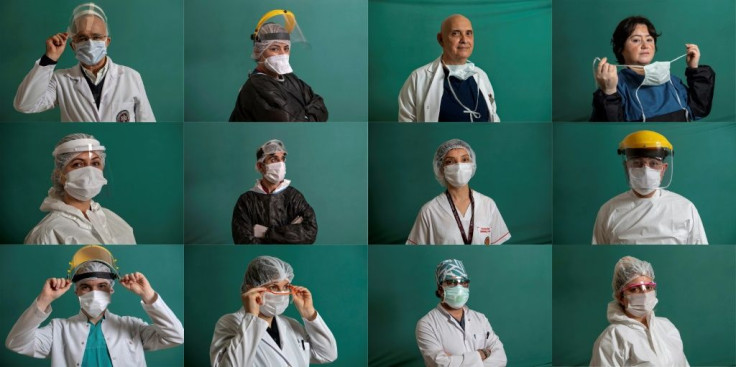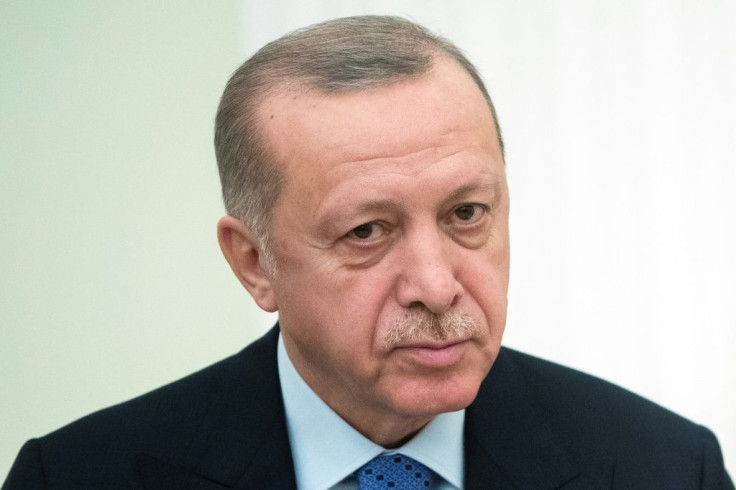Erdogan Under Pressure As Coronavirus Cases Spike In Turkey

President Recep Tayyip Erdogan has stepped up measures to stem surging coronavirus cases in Turkey but his refusal to impose a full lockdown in order to keep the economy afloat is drawing criticism.
With gatherings banned, restrictions on intercity trips, and the obligation to wear masks almost everywhere, Erdogan has imposed a series of tough measures but so far resisted calls for a complete lockdown.
Parliament on Tuesday began debating a government-sponsored bill to release up to a third of detainees in the country's overcrowded prisons as a safety measure against the coronavirus outbreak.
With 38,226 cases and 812 deaths, according to official figures published on Wednesday, Turkey is the ninth most COVID-19 affected country in the world.
What is alarming is the fast spread of the disease in Turkey, which reported its first official case on March 11. The number of cases is doubling every few days: From 7,400 on March 28, it reached 15,000 on April 1 and exceeded 30,000 on Monday, according to official figures.
The government has very quickly taken nationwide measures from shutting schools and cultural spaces to suspending flights.
They have been gradually reinforced with a confinement order for people aged over 65 and under 20 and quarantine of dozens of towns and villages.
The interior ministry said on Wednesday more than 150 more areas including two districts were placed under quarantine.
Turkish authorities have begun to ship packages of masks to homes from Wednesday with a letter from Erdogan after the government banned their sale.
In the letter, Erdogan said Turkey is "one of the countries best equipped to face the coronavirus pandemic", praising in particular the quality of hospitals.
Health Minister Fahrettin Koca tweeted the number of patients in intensive care was on the decline, saying: "Our success depends on isolation."
But as the number of victims soars, there have been increasing calls on the government to impose a complete confinement like those imposed a number of European nations.
"Everyone absolutely has to stay at home, it must be made compulsory," a doctor who treats infected patients in intensive care at an Istanbul hospital told AFP on condition of anonymity.

"We are receiving more and more patients every day. We will soon reach the limits of our capacity."
The opposition parties, the country's main medical association TTB and unions have also urged the government to take tougher measures to deter people from going out.
"It will be impossible to control this pandemic if millions of people... go out to work," the president of the Turkish Doctors' Union (TTB), Sinan Adiyaman, told the Turkish media this week.
In an interview with AFP last week, the opposition mayor of Istanbul called for confinement measures in the country's economic capital where more than half of the COVID-19 cases have been recorded.
"Even if 15 percent of the population goes out, we quickly reach two million people... This has the potential to increase the threat."
Erdogan has so far urged Turks to place themselves in "voluntary quarantine" rather than declare a compulsory order for them to stay at home, in an attempt not to stop an already fragile economy which has been in a recovery state after years of crises.
Last week, he said: "Turkey is obliged to continue producing and keep the wheels (of the economy) turning under any circumstances."
Before any hardening of the measures, many Turks have already taken their own precautions. Most of Istanbul's usually busy arteries including the pedestrian Istiklal Street are almost deserted.
Many Turks no longer set foot outside -- some of them have returned to the age-old tradition of lowering baskets through their window for their groceries, while some others rely on very efficient delivery services.
The doctor at Istanbul hospital hailed residents' common sense and "good measures" taken by the government which has ramped up tests to reach over 200,000 thus far.
But he warned: "If the number of cases keeps increasing at this pace, the result will be the same as elsewhere: many losses of lives. We have already lost a lot of time."
gkg/fo/har
© Copyright AFP {{Year}}. All rights reserved.




















